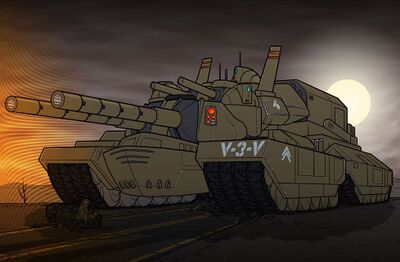UHAV-X
This article is incomplete because it is pending further input from participants, or it is a work-in-progress by one author. Please comment on this article's talk page to share your input, comments and questions. Note: To contribute to this article, you may need to seek help from the author(s) of this page. |
| UHAV-X Smilodon | |
|---|---|
 | |
| Type | Ultra Heavy Battle Tank |
| Place of origin | Template:Country data Kalaron |
| Service history | |
| In service | 2025-Present |
| Specifications | |
| Weight | 750 t (740 long tons; 830 short tons) |
| Length | 60.4 m (198 ft 2 in) (hull only) |
| Width | 15 m (49 ft 3 in) |
| Height | 9 m (29 ft 6 in) |
| Crew | 1 (Optional) |
Main armament | HAMMR APVLS 2x 230mm LVML 2x HVPA |
Secondary armament | 8x RWS 4x LWS |
| Engine | 7000 PS |
| Power/weight | 9.3 PS/ton |
| Suspension | Torsion bar suspension |
| Speed | 50 km/h |
The UHAV-X Smilodon UltraHeavy Assault Vehicle is a domestically produced autonomous vehicle in Kalaron, designed to supplement an Expeditionary Army by drawing fire from the main body of the Force. Vehicles in this platform family are exceptionally hardy, equipped with large caliber weaponry, and highly mobile for it's size. Owing to the risks in creating such a large design, production of the line was only approved following the successful implementation of the original UHAV-X during the war in the Fascistic Empire of Kylodan, where the Smilodon prototype served as a decoy before rejoining the main force for their push on the Capital.
Additionally the body of the vehicle is lined with Remote Weapon Systems, MP-31 APHE discharge canisters and the "Thunder-Breaker" Soft and Hard-Kill systems. Designed to protect the Smilodon from Infantry, Vehicular and Missile threats, a datalink to several launchable drones allow the Central Control Computer to prime selected defenses and feed them target locations. Later models incorporated Ground-Level IFF receivers to allow it's incorporation in generalized units.
History
Development
Operational history
Design
General characteristics
Active Protection
Active protection is provided by both the MAGNox Mine Detection System provided by Althur Industries and the Thunder-Break Projectile Kill systems mounted on the UHAV-X series. This Mine Detection System, formed through research into deep-rock detection in conjunction with the Penguanian Kingdom, can detect mass shifts in rock and sediment to show the placement of nonmetallic and ferromagnetic mines ahead of the vehicle in a 30m line, though this range decreases the accuracy of the narrow beam search. Data-Linked Mine-Flayers are typically deployed with the vehicle to confirm the accuracy of it's mine-searches.
The Thunder-Break System is comprised of both Anti-MANPAD and Anti-ATS missile interceptors deployed from the RWS stations around the vessel and the Large Missile Bay affixed to the back. These larger missiles are made quad-packed Lightning Interceptors around the short-range ballistic missiles, increasing their general protection from most fire. A limited amount of smoke grenades are equipped to cloak it in Infared-Obscuring mist with metallic refractents.
Armour
The armour of the Smilodon is of a layered design, being focused on the essential elements of the vehicle and their connections rather than monolithically placed, with a thin exterior armour wrapping around the rest of the superstructure. Much of the residual armour around the core components is focused towards shielding infantry from fire, after the SPYNX update. Although the composition remains secret, it can be assumed that large boron nitride ceramic slabs overlay the Internals, with sandwiched NxERA materials and separated ceramic armour disks. The thin hull above this system -barring the engine itself, which is durably protected- is just barely capable of protecting against 20mm weaponry, and focused towards preventing a direct shot towards the superstructure.
Crew protection features
Armament
Although designed to penetrate into enemy territory, the weaponry fitted to it is designed to be used defensively. While the armour and ECM provide survivability to the system, only the armament of the vehicle can force adversaries to keep their distance from the Smilodon. As such, the focus during it's design was to
| High Velocity Projectile Accelerator | Low Velocity Missile Launcher | HAMMR VLS | M17 Remote Weapon System | IO-3 Laser Weapon System |
|---|---|---|---|---|
| Example | Example | Example | Example | Example |
| Example | Example | Example | Example | Example |
| Example | Example | Example | Example | Example |
| Example | Example | Example | Example | Example |